From Kobe Bryant to outdoor weddings, Bishop Jenky answers students’ questions
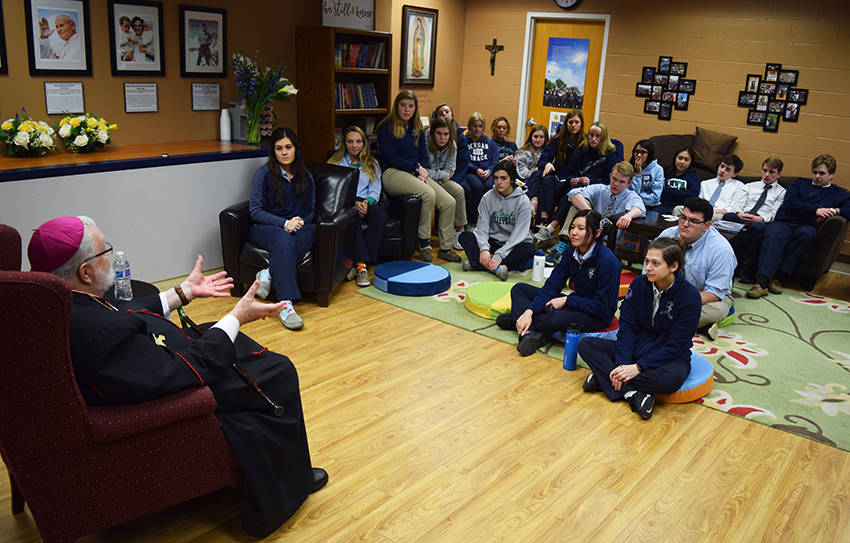
Bishop Jenky answers questions from junior leaders at Peoria Notre Dame during his Catholic Schools Week visit to the high school on Jan. 31. (The Catholic Post/Tom Dermody)
- “Could Kobe Bryant become a saint?”
- “If God loves us so much, why would he punish us to eternity in hell?”
- “What is something that you wish you could tell all the young people of the church?”
Those were just three of the nearly 20 questions that junior class leaders at Peoria Notre Dame High School posed to Bishop Daniel R. Jenky, CSC, during a lively question-and-answer period on Jan. 31.
Bishop Jenky made a Catholic Schools Week visit to Peoria Notre Dame that Friday morning to celebrate an all-school Mass in the gym. Following Mass, he met with about 35 members of the school’s Bishop’s Leadership Committee — a select group of juniors that gathers regularly for training in virtue and Christ-like servant leadership.
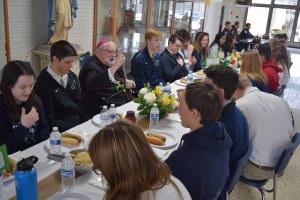
Bishop Jenky joined a group of senior leaders for lunch and conversation during his Jan. 31 visit to Peoria Notre Dame. Here he offers the pre-meal prayer and blessing. (The Catholic Post/Tom Dermody)
Seated with the students in Notre Dame’s campus ministry room, the bishop invited their questions.
“You can ask me anything,” said Bishop Jenky. “I’ve spent a lot of my life living in men’s dorms at the University of Notre Dame, so there’s nothing I haven’t heard.” The students obliged with a broad range of questions (see below) ranging from aspects of the bishop’s own life and vocation to various teachings of the Catholic faith.
Bishop Jenky concluded his visit by joining senior class leaders for lunch in the school commons.
Meanwhile, for the curious, capsulized answers for the opening questions in italics are:
- Kobe — Yes, we are all called to be saints.
- Hell — We reject God, God doesn’t reject us.
- To youth – Fall in love with God. He’s in love with you.
Following is the full list of questions asked by the students. Bishop Jenky’s answers have been slightly edited for length.
How many popes have you met?
Three — St. John Paul II, Pope Benedict XVI, and Pope Francis. They are all different personalities. I had the most quality time with John Paul II. I saw Pope Benedict in St. Peter’s Square. I was presenting the case for Fulton Sheen to be beatified. He said, “Fulton Sheen, I knew him. He should be a saint!” I was so elated I said “Holy Father, the microphone’s right there!” He laughed. It’s good when the pope laughs at your attempts at humor!
When did you know you wanted to become a priest?
It was on and off my mind when I was in grammar school. I lived in a real Catholic world. I did not want to be a priest when I was in high school. I went to the University of Notre Dame, where there are priests everywhere, and they all seemed like men on fire, great teachers, so I decided to test my vocation. If you are thinking of any vocation, including religious life or the priesthood, you can put your toe in the water and see if you want to get in. You can always get out. When I was a novice, I packed up to leave four times. But something always kept me.
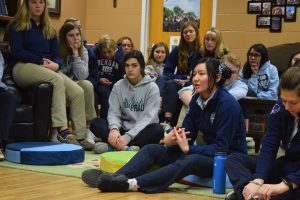
Sophia Sison, a junior at Peoria Notre Dame, poses a question to Bishop Jenky during his visit to the school on Jan. 31. The bishop spent 45 minutes answering questions from members of the school’s Bishop’s Leadership Committee. (The Catholic Post/Tom Dermody)
Have any of your religious views or opinions changed over the years?
Oh, yes. If you don’t change, you’re dead, they say. You get challenged by changing circumstances. We have a lot of good and wise priests in this diocese and they aren’t afraid to tell me things.
I know the priests here and feel very much at home. Seminarians treat me like a bishop. Priests my age treat me like Jenky. They tell me what I’m doing right, wrong, and what I should do, or shouldn’t do. It’s like a family.
What was your reaction when you were called to be a bishop?
Sheer panic. I was living in Fischer O’Hara Grace, a graduate dorm at the University of Notre Dame. It was on a Tuesday morning. The papal nuncio was scheduled to come to campus for an anniversary of the school’s famous grotto. He was very difficult to understand, so we were joking ahead of time that when the nuncio smiles, you smile. When the nuncio frowns, you frown.
So when I heard — “This is Agostino Cacciavillan. The vicar of Christ, the pope, wants you to be auxiliary bishop of Fort Wayne-South Bend. You will say “yes.” — I said, “OK, who is this?” I was sure it was one of the students. They’re incredible mimics.
This went on for awhile before I realized it was really him and I said (meekly) “Yes.”
Whenever you make a decision, someone is going to get upset. How do you feel if you upset people in the church?
Differently. At my best, I listen. Sometimes I confront them. Some people, I think their favorite thing to do is scream at the pastor, scream at the bishop. Mostly, if you give them a hearing, and are respectful to them, they are respectful back. I don’t take disrespect. When they get hateful, I’ll sometimes say, “I’m a human being, you’re a human being. This conversation ends unless . . .”
I’m now in my 18th year as bishop here. I’m probably more patient now than I was when I first got here. You realize sometimes that they’re screaming at you, but they’re mad at something else. I don’t like it when they’re nasty to our priests. And school principals get blamed for everything. But mostly people are nice and I enjoy being with them.
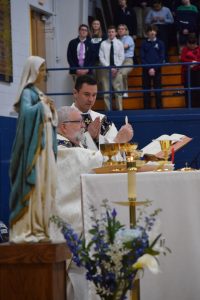
Bishop Jenky celebrates a Catholic Schools Week all-school Mass at Peoria Notre Dame High School on Jan. 31. Concelebrating is Father Corey Krengiel, school chaplain. (The Catholic Post/Tom Dermody)
Say a person is baptized into the faith, but then they didn’t do the obligation. But then again they were a good person, and treated everyone like Christ would. Since they didn’t do the obligation, would that condemn that to hell?
That’s a very good question. I think the answer is obviously, no, it would not. The Lord judges the conscience, the heart. They may have made a mistake. Living a good life without the support of the sacraments and other Christians is pretty hard to do. There are atheists who live good lives, but obviously the fullness of faith is to be there with your brothers and sisters, not only for your sake, but for their sake.
God is not out to get us. That is not to say there are not consequences for our bad choices. There is such a thing as sin. There is malice. People can do awful things. God is merciful, but He is not blind.
The Gospel is a two-edged sword. It gives enormous, endless comfort. But it also give enormous, endless challenge.
The best teachers I ever had were not the ones that always gave me an “A.” Sometimes they’d give me the paper back and say, “You can do better than this.” That’s part of love.
God doesn’t give up on us. That’s a great comfort. But he also doesn’t give up on us growing.
Have you been to the March for Life?
Yes. I used to go pretty regularly in my first years here. My marching days are a little behind me. I love it for all sorts of reasons. Obviously, I’m pro-life. It’s also like a Catholic pep rally. Kids from all over the country are there. The liturgies are beautiful. It’s the younger priests who get on the bus. Even when I was a much younger bishop, I was on a plane!
It builds up my faith. I kind of miss going. I’ve been there when the weather was beautiful and sunny, and I’ve been there when you’re waiting for Dr. Zhivago to come out of the Siberian wilderness.
Do you prep your homilies or do you sort of improvise the entire time?
I prep. You can get away with riding bareback once or twice. There are priests, not in our diocese, you know they haven’t thought of a thing before they preached.
It’s better that we prepare our homilies, think about what we’re going to say. You think of one big message. You introduce it. You give an example. And then you get off. And less can often be more.
Preaching is an important responsibility. Every priest in the world can relate that sometimes you’re on, sometimes you’re off.
Priests and deacons should put in the effort. It’s an opportunity to proclaim the Good News.
Say somebody didn’t know that they are not supposed to receive the Eucharist after they mortally sinned, but they continue doing that for the rest of their life, just not knowing. So does that sin not count for them?
If you don’t know, there’s no sin. The last two generations of Catholic were not well taught, not well catechized.
God is not there like the state police at the end of the month when they really want to give out tickets. It’s the opposite with God. He wants to win your heart and your love. People make mistakes. People get in trouble. Even with some of our deliberate sins, God is there to say “I forgive you.”
Sin is not a mistake. Sin is not an accident. Grave sin is “I know it. I consider it. I give it the assent of my heart and will. And I do it.”
But grave sin can be forgiven. St. Thomas Aquinas once taught that the tiniest drop of the Lord’s atoning blood wipes out all the sins of the world.
If God loves us so much, why would he punish us to eternity in hell?
You’re asking one of the greatest questions there is. First of all, the doctrine of our faith is that we have to believe in the possibility of eternal loss. And the way it is usually described is we reject God, God doesn’t reject us. So at a certain point his mercy is there, and out of sheer malice we reject it.
Jesus taught there are a lot of surprises at the Judgment Day. Finally that judgment, thank God, is God’s. He will read and judge the heart.
The Psalms say, “His mercy is without end.” But he is also perfectly just. Christianity offers hope and promise. God is on our side. He loves us. But we should not say that our human acts aren’t consequential. Jesus, in his own preaching had a lot of both things. Endless mercy, but he wants our heart. He wants a response. And it’s up to him to judge the living and the dead, not your bishop, thank God.
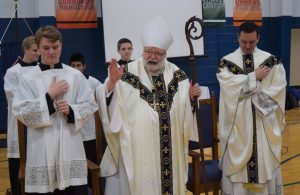
Bishop Jenky offers the blessing at the close of an all-school Mass at Peoria Notre Dame on Jan. 31. (The Catholic Post/Tom Dermody)
What’s your favorite thing to do in your free time?
I have a little hideaway house. It’s in Henry. It is two rooms. It’s 45 minutes from my garage in Peoria to that house. It has a deck looking out on an inlet of the Illinois River. I love sitting on the deck with a fat book in my hands looking out all the different times of the day. At this stage in my life I like sitting on that deck. And I love reading.
I used to love swimming. I used to swim six days a week at Notre Dame. I used to like walking. I can’t do that much anymore.
I love company and I like meals with those I feel comfortable with.
Who is your confirmation saint and why did you pick him or her?
It is Patrick. My dad was Polish and my mother was Irish. And my Irish grandpa moved in with us when my grandmother died. He was a tough old guy. But he loved to tell stories. I could listen to him forever. I loved him. I can’t say I took Patrick in honor of the glorious patron of Ireland, I took Patrick because I loved my grandpa. There is something about grandparent love that’s amazing.
Who is your favorite sports person and why?
I knew Rocket Ishmael real well when he was at Notre Dame. This will take you back. Minnie Minosa was a baseball player I grew up listening to and watching. Today I like basketball because it moves faster.
Could Kobe Bryant become a saint?
Of course he could. We’re all called to be saints. That doesn’t mean you’re perfect. Only the Blessed Mother, through a unique gift of grace, was without sin. Kobe was raised Catholic in Italy, his Dad played basketball in Italy. He practiced his faith but kind of had some rough moments. At a moment of crisis, he returned to the faith and was a very serious Catholic from what you read. He was very charitable, gave a lot of money for the poor. His family did not miss Mass on Sunday, from what I’ve been reading. But that doesn’t mean he never made a mistake.
Our Fulton Sheen, who I certainly hope gets beatified this year, was at your school’s ancestor, Spalding Institute. Archbishop Sheen said his prevailing fault was pride, and he spent a lifetime growing in humility. That didn’t mean he wasn’t a saint. He loved the Lord and he certainly served him.
What was your reaction when they had to stop the beatification?
I might have said “Aw, shucks.” (Laughter.) Bishop Sheen was ordinary of Rochester for less than three years. He was a great speaker and writer, but administration was not his strong suit. The only two cases that had to do with priests guilty of sexual misconduct came to his attention and that was when people had unbroken faith in how to cure people. In both cases, he told the priests “You will never serve in this diocese.” I think he was heroic and prophetic.
I hope (the beatification) will happen this year. I hope you will have an alumnus of your school, Blessed Fulton Sheen.
Where is the most beautiful church you’ve ever been to?
You mean besides our cathedral? And besides the basilica at Notre Dame? In this diocese, there is St. Dominic’s Church in Wyoming. I think it’s one of the most beautiful churches in the diocese. It’s so beautiful. We have a lot of gorgeous churches. Sacred Heart Church in Rock Island is stunning.
God is praised and glorified in the garage, but it’s kind of nice when the church is beautiful.
What if a Catholic wanted to have their wedding outside or at the beach?
We used to say “Have the reception out there.” The thing we have to keep counter-cultural is that marriage is a sacrament. And it should be celebrated where you worship. It’s all about God loving you, you loving your spouse, and making the most important promises you’ll ever make in your life. It should be before the altar of the Lord in the presence of the Blessed Sacrament.
Today especially, not all Catholics are well catechized. They don’t understand they’re celebrating an act of Christ. It’s a holy thing. You can pray very well sitting at the ocean or in the woods. But the reason our church tends to resist that at weddings is to remind people that marriage is holy. You’re connecting yourself to the universal Catholic Church in an act of Christ.
If you were to marry someone who wasn’t Catholic in a Catholic Mass would the sacrament still be valid?
Yes, for both of you — even if you marry someone who didn’t believe marriage was a sacrament. We believe they’re getting it anyway. It’s an act of Christ by which the couple become one spirit, one flesh, and grow into that all their lives.
I usually recommend where there is a mixed marriage that they not have Mass, that they have the sacrament – basically the first half of the Mass – because half the people can’t go to Communion.
I think the church goes out of its way to be accommodating and respectful, especially to the other Christian traditions.
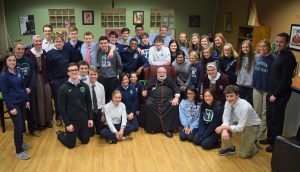
Members of the Bishop’s Leadership Committee at Peoria Notre Dame — student leaders from the junior class — pose with Bishop Jenky after a lengthy question-and-answer period with him in the school’s campus ministry office. (The Catholic Post/Tom Dermody)
What is something that you wish you could tell all the young people of the church?
The heart of our faith is to fall in love with God. He’s in love with you. You could have all the books, all the learning, all the organization, Notre Dame high school sports, the do’s and the don’ts, but the core experience is where in Jesus Christ you meet the Lord. And his love touches you. He becomes your friend.
It amazes me – Catholics and non-Catholic Christians – they can “walk the walk” but they’ve never met Christ. I don’t know how it happens, but it does. I’ll bump into people who made a Cursillo weekend and they’ll come up to me and say “I’ve been raised a Catholic, I don’t miss Mass on Sunday, but it was at Cursillo where I met the Lord.” At our Newman Centers, we do Koinonia retreats, students witness to their faith, and sometimes that’s where the students discover “Oh, that’s what it’s about.” At some point you have to meet Jesus. He’s the full revelation of who God is and what God’s about. And you have to know him. And this is the amazing thing: He’s knowable.
We all need those moments. It happens different ways for different people. You’ve got to do your part. Every now and then you have to make a space. I think one of the biggest mistakes in prayer is always being polite with God. You can complain to God. You can say, “I hate this!” or “Help me!” or “I’m in trouble!” Open the book of Psalms – they are filled with the rawest emotion.
You don’t pray always because you feel like it. Some of the best prayers are when you’re little dry. Like when, as parents, your kids are driving you crazy but you are still there for them. You’ve got to be committed to it.





